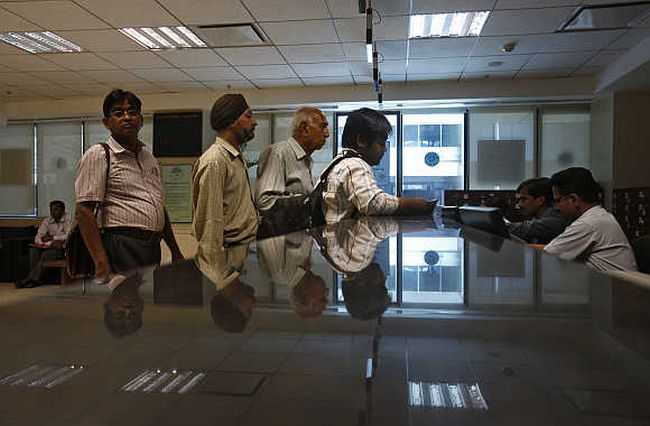Photographs: Reuters Rakesh Nangia
With July 31 just around the corner, everyone must be busy with their Income Tax returns.
Filing returns has become convenient since it can now be done electronically.
But the flip side to this is that taxpayers often wait till the last day to complete the process.
Due to this often there could be mistakes in the returns, which can lead to problems later.
Many of these common mistakes are simple, human errors.
Paying attention to these things can make returns filing a smoother and error-free process.
Please click NEXT to know some of the common mistakes taxpayers make and the consequences. . .
Filing tax returns? Avoid these errors
Image: There are five forms to choose from, depending on the source (s) of income.Photographs: Reuters
Choosing an incorrect form
This is the first step to filing tax returns.
And taxpayers need to be careful about the form they choose.
There are five forms to choose from, depending on the source (s) of income.
If you make a mistake in choosing the right form, the entire exercise of filling returns will need to be redone.
Here’s what each Income Tax Return stands for:
ITR 1: For those who earn an income from salary, pension, other sources -- interest income on savings bank account and fixed deposit -- and from one house property
ITR 2: For individuals or Hindu Undivided Families that earn an income from all the sources given in ITR 1, more than one house property, capital gains, other sources, and foreign assets
ITR 3: For individuals or HUF who fulfils the criteria in ITR 2 and are also a partner in a firm, but do not carry on a proprietary business or profession
ITR4: For individuals having income from business or profession
ITR4S: For individuals having income from presumptive business
Please . . .
Filing tax returns? Avoid these errors
Image: One should ensure that a valid and functional e-mail address (that is regularly used), is provided in the ITR form.Photographs: Andres Stapff/Reuters
Providing incorrect personal details
Every year a large number of returns are rejected because of incorrect personal details. The ITR form needs both residential and e-mail address.
One should ensure that a valid and functional e-mail address (that is regularly used), is provided in the ITR form.
If you are staying in a rental accommodation or hostel, avoid mentioning that address on the form.
Instead, mention your permanent address, where a communication from Income Tax Department can be received/attended to.
The Permanent Account Number is often written wrongly in ITR.
Missing even one number or alphabet of your PAN will lead to your ITR form not being processed.
Besides, you could be levied with a fine of Rs 10,000 for an incorrect PAN entry, as per I-T rules.
Similarly, you should be be careful about Tax Deduction Account Number of your employer.
You can find this number in your Form 16.
If you are expecting a refund, you need to mention your bank savings account number and the nine-digit MICR number correctly.
Or, your refund may get delayed unnecessarily.
This is another common mistake taxpayers make regularly.
Please . . .
Filing tax returns? Avoid these errors
Image: People file Income Tax returns.Photographs: Mansi Thapliyal/Reuters
Failure to include certain income
There are certain incomes which are left out erroneously as many taxpayers don't know that the same should be mentioned at the time of filing taxes.
For instance, income from other sources or interest income and so on.
Income from other sources: Long-term capital gains and dividends from equity mutual funds and listed securities are not taxable if held for more than one year.
That is, the long-term capital gains tax on equity and related instruments is zero.
But such capital gains form a part of your income from other sources and you need to give details about these in the tax returns form.
Short-term capital gains on equity and related instruments is taxed at flat 15 per cent.
At the same time, short-term capital gains from debt funds is taxed at slab and long-term gains from debt funds will be taxed at 10 per cent without indexation or 20 per cent with indexation, whichever is lower.
However, this year’s Annual Budget has changed this rule and these will be taxed differently for investments made in the current financial year.
Please . . .
Filing tax returns? Avoid these errors
Image: The portal will take into account Form 16A details you've added and compute the data.Photographs: Reuters
Not considering more than one Form 16: If you’ve changed jobs in the middle of a financial year, ensure that you collect your Form 16 from the previous employer as well.
Many make the mistake of reporting only the current employer’s income in their returns.
Since one has availed tax benefits from both employers, there could be a possibility that you still owe some additional tax liability at the time of filing tax returns.
Missing TDS details: Since all banks deduct tax at source for the interest income accrued on your fixed deposit accounts, it doesn’t mean you don’t assess your tax liability and mention it in your returns form.
In reality, banks only deduct 10 per cent tax on interest income, whereas you may be in the higher tax slab of 20 per cent or 30 per cent.
So if you don’t give information about interest income in the returns form, there is a chance that you may receive a notice from the tax department.
The portal will take into account Form 16A details you’ve added and compute the data.
The same is the case for interest income earned from savings bank account. Such income is subject to TDS if it is more than Rs 10,000 annually.
Please . . .
Filing tax returns? Avoid these errors
Image: Once submitted you get the ITR Verification form.Photographs: Reuters
Mailing returns verification
Filing income tax returns does not end at filing it online and submitting.
Once submitted you get the ITR Verification form.
This is the acknowledgement of the returns filed by you.
This form should be printed, signed by the assessee and sent to I-T department’s Bengaluru office.
This should be done within 120 days of filing the returns.
Unless you send the acknowledgement, you have not completed the entire process of filing returns.
And your returns will be considered not filed.
Make sure you sign the ITR-V form only in blue ink.
If signed in black ink, it is considered to be a copy of the original ITR-V and is rejected. Also you should mail the ITR-V either by normal Post or by Speed Post.
Do not send by courier as it will not be accepted.
Please . . .
Filing tax returns? Avoid these errors
Photographs: Illustration: Uttam Ghosh/Rediff.com
How to revise mistakes
The I-T department allows assessees to revise returns for mistakes.
But there are some conditions to adhere to.
Firstly, you can revise returns only if you file them on time, that is by July 31.
Also, revision is allowed only if the omission was unintentional.
There is also a time line.
You can revise I-T returns before the expiry of a year from the end of the assessment year or before the completion of assessment of returns, whichever is earlier.
So, the returns of assessment year 2010-11 can be revised till March 31, 2012, or before the completion of the assessment.
That’s why it is suggested that assessees take a few moments out a little in advance to take a careful look at what is required in the ITR form, read the instructions and then file returns.
This can prevent a lot of these errors.
Rakesh Nangia is managing partner, Nangia & Co Chartered Accountants









article